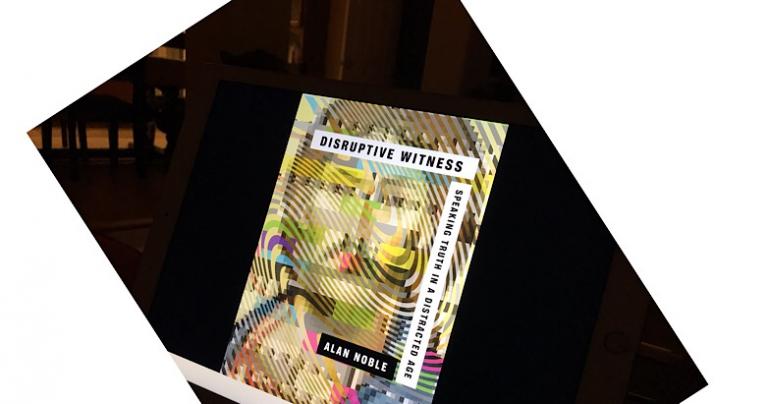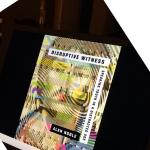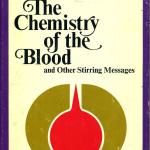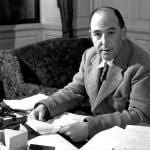
I go to a Church that tweaks the liturgy every few centuries, whether it needs it or not. We are not old-fashioned, just persistent to the point of puckishness. We have not yet capitulated to the Visigoths, let alone “secular conceptions of faith as a personal lifestyle preference.” We have resisted Lenin and radical forms of Islam all in the last fifty years. One can meet the survivors every Sunday!
We persist and merely persisting seems disruptive to me. Most vitally, the Orthodox do not persist as a strategy, but because we are doing what we do in communion with all the saints.
These are thoughts inspired by an excellent book by Professor Alan Noble: Disruptive Witness. I have had concerns, but saying something that challenges much of who we are in North America is difficult. Noble has done this well.
Noble says we are buffered from metaphysical reality by our gadgets and culture. This leads to a default secularism that comes at a price, as reality-denying always does. He says:
The church must embody the faith in such a way as to reveal its exclusivity, solemnity, transcendent power, incarnational theology, and authority.
I think even my Protestant liturgical friends (see those wonderful Lutherans, certain Wesleyans, and the remnant of Anglicans) will agree and hope they get a shout out. This much is sure: if you are at a Church where the liturgy of John Chrysostom is said, then exclusivity, solemnity, transcendence, power, incarnational theology, and authority are not an issue.
Disruptive Liturgy
We Orthodox are exclusive to the point of keeping the Feast for those whom we know are in the Church. We are solemn, leaving jollification for the feasts (Pascha!). The Orthodox in a land like Syria may lack political power, but King Jesus is imaged over our heads. We are urged to be transformed (see: theosis) so as God became man, we can become God. Our authority structures are positively Byzantine.
Let me assume that Professor Noble has no desire to become Orthodox. Perhaps the fact that we persist for centuries in lands where we are declared second-class can serve as a model? The pressures that Noble describes do exist. Our young people face them, too, but at the very least, if one leaves a highly liturgical church one knows what one is losing.
One can change a t-shirt easily, but not forget the sounds of Rachmaninoff’s Vespers. My Anglican friends (or those of us in the Western Rite of Orthodoxy) might reject the God of Evensong, but even Richard Dawkins (I am told) struggles with the loss of beauty.
Leave aside particular theological issues for a moment. Isn’t there some deep liturgy that any big-Evangelical church could adopt? Do we need to reinvent what centuries have made lovely?
Noble takes on contrived awe and this is just so. The power of an unchanging liturgy, which does preclude Bible study, prayer groups, or other forms of outreach, is that we fit to it. The beauty is there, even when (as is often the case) I am ugly. The liturgy does not need me—I need the liturgy.
Disruptive Heritage
Again, even if you forget the Faithful of Orthodoxy, looking only at those Protestant churches, this description seems too much:
As Western culture has shifted its focus inward, toward disengaged reason, Taylor sees a parallel move within Christianity—a move from embodied forms of religious worship to those in which religion is essentially something that only happens in your head. Taylor calls this move “excarnation,” since it devalues and nearly erases the role of our bodies in worship. Consider his description of modern culture, including modern Christianity.
My office is near a basketball arena turned excarnational church, but other options abound. When my son was asked to visit a church different from his own for a college class, he had choices of Protestant liturgy ranging from Anglo-Catholic to vibrant charismatic worship. He ended up in a wonderful Spanish-speaking church that was not big on formal liturgy, but full of Scripture, mystery, and incarnational practices.
The Big Box Church is not the answer, yet congregations more faithful to the deep customs have not always grown. Too often they have been reactionary rather than faithful. A priest who went on to suffer a kind of martyrdom for his witness told me once before he died that the last recourse of the shallow or the heterodox is getting the vestment colors just so.
The liturgy is not a performance, but a participatory act. When the choices were the Evangel with problems or the Old Ways with no life, then many chose the evangelical road. If now the choice is suspect, perhaps the time has come for those people to reclaim the heritage of the hymns, service books, and customs of their mothers and fathers (in a spiritual sense).
Disruptive Testimony
When I was a boy, I heard very old men sing songs during testimony time that arose from the West Virginia hills. These songs were lost when rising wealth tempted the congregation to buy hymnals instead of making music, and fund programs instead of finding God together. They professionalized and much that was precious was lost. Perhaps we could recover what can be found in the moment for musicologists while maintaining the fervor of the faithful—but only in those communities where an authentic liturgical form has been preserved.
You cannot geld the liturgy and then bid it be fruitful.
Noble agrees with James K.A. Smith:
. . . Smith argues that modern Christians have put far too much emphasis on encouraging believers to believe the right things, rather than shaping what we love and therefore desire through liturgies, which Smith defines as “rituals of ultimate concern.”
In decades of Christian college teaching, I have met few students overly catechized on the ideas of the Faith. Maybe Noble and Smith have had generations of students that had strong views on Trinitarian dogmas or substitutionary atonement (as they understood it), but if so, they have had a wholly different experience.
Second, orthodoxy, as lived by the faithful, cannot even grasp a distinction between “right doctrine” and “right worship.” This is not a matter of getting some balance right, but of incarnational truth. When Lutherans, Anglicans, and Orthodox evangelicals say Creeds weekly in a liturgy that is the work of the faithful over centuries, the distinction is meaningless.
Disruptive Decision-Making
It is here I pause and wonder whether Professor Noble, who relies on the work of Professor James K.A. Smith, is not making an error. Too often this section of the book reads as if we must recover or choose from traditions to achieve certain goals. To be picky, for example, contra-Nobel, our culture does not celebrate Advent, ignoring this time of fasting and doctrine to jump straight to Christmas.
We in the West are then gypped out of Twelve Days of Christmas and forced to cram the merrymaking into one day. We do not fast, so we are unready for sustained feasting.
I agree wholly with Noble’s goal but worry about any liturgical innovation that mostly leaves the living in charge of decision making. If we are as in need of medicine as Noble suggests, and certainly I am, then we are the wrong people to prescribe medicine.
This verges on smart-guy consumerism. We must recover a tradition we do not control or join a group that has never lost such organic liturgy or we are merely aesthetically sophisticated consumers. Liturgy is the work of the people—not, I think, the work of academics. This work goes together with catechesis in creeds. (I prefer seven if we must give a number.)
To agree with Noble: let us sing together! That is an embodied act and uncomfortable to a consumer culture that looks for professionals to do the singing. Yet if we simply get to pick the music, then we have not gone far enough. Authentic Christian communities will give some choice, but also prescribe as medicine to our souls certain chants and music.
Singing together songs we have entirely chosen is like knowing that we are poor, blind, and sick and then out of our poverty, blindness, and sickness deciding what will make us rich, help us see, and be well.
Disruptive, but Not Far Enough
Noble gets this just right when he talks about readings from Scripture (please!) and God’s law. If we pick the readings, we will too often let our particular culture drive us:
This is morality within the immanent frame, morality mapped by corporate interests, trending topics, convenience, and expressive individualism.
Thank God there still exist many Lutheran, Wesleyan, and other churches ready to be enlivened and old patterns of worship to which our immediate demands can be submitted!
On this, I can only say “yes, Amen:”
It’s hard to imagine an act more disruptive to secularism than celebrating the Lord’s Supper. Every movement in the liturgy of the Lord’s Supper calls us away from a distracted, flattened, material, individualist, and secular view of the world. The reading from the Gospel grounds the sacrament not in mythology or doctrine but in time and space, and it rips us out of our presentism. We are joined with saints across two thousand years, hearing these same words and partaking in the same sacrament because of one God-man and his words and deeds: “On the night when he was betrayed [the Lord Jesus] took bread, and when he had given thanks, he broke it, and said, ‘This is my body, which is for you. Do this in remembrance of me’”
My complaint with Noble (and mayhaps Smith) is that they are disruptive, but not enough. We are still picking and choosing, the tyranny of the living over the Blessed Dead. Who would not prefer the saints in glory in their wisdom to our own battered souls?
They speak wisdom. Let us attend. (And Professor Noble, I am convicted to once again leave my phone at home.)
Do we live in a world where Thomas Cranmer, liturgist, is the most disruptive Western thinker of all?
Buy the book.
_______________________
Alan Noble is the “co-founder and editor in chief of Christ and Pop Culture.” If you are not reading Christ and Pop Culture and you are interested in Christ and/or Pop Culture, then bad. Go and subscribe.
I am slow-reading his new book. Part 1, Part 2, Part 3, Part 4, Part 5, Part 6.
Rachel Motte edited this essay and added the sub-headings.















